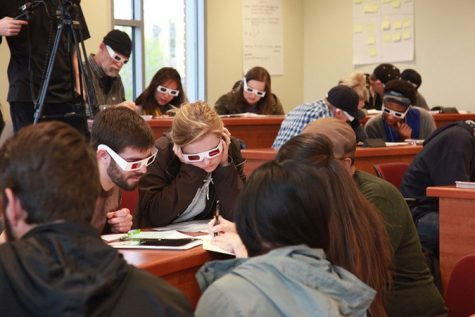Making sense out of investing
Investment: more than quick cash for students
October 29, 2007
You can’t keep track of where you’re spending your money. You’re paying high tuition so you’re applying for loans, but you’re worried about how you’re going to pay your debt after college. You need more money fast. So here’s the big question: What’s a way you can make money besides going to work all day? You invest in stocks.
Some actually believe that by doing so, they’ll earn extra money, extra fast. This, however, isn’t quite true nor is it encouraged, particularly at Biola. The students at Biola, specifically juniors and seniors, are beginning to invest in stocks, but for a different and more proper purpose: to learn and experience.
Galen Haws, a senior business major, first learned about stocks in high school and began to get involved in his stock investment during his sophomore year at Biola. His purpose for investing in stocks was to learn because it provides “visions and goals in where [he wants] to be in the future, and investing in stocks is the best way to get there.”
The dean of the business department, Larry D. Strand, explained that it is part of the business education to teach the students and prepare them to “experience the business skills and principles … of the free market system in the United States.”
Harold Taber, the director of the MBA mentor program, also encourages students to invest in stocks. However, he said if their purpose in investing is just to get money fast and easily, the focus is “based on their financial condition,” and that’s when money becomes an idol. He said Christians should be careful not to fall into these temptations, but be wise and look at it from the right point of view.
Dr. Jim Canning, a professor in finance and management, concurs with Taber.
“If [students] are investing just to try to make a quick buck, it’s risky,” Canning said.
Canning explained that “everyone who wins money, loses money,” so people involved in stock investment need to recognize the risk involved in trading. Taber defines that risk as when “[people] don’t do enough diligence” to see where the conflict in stock investment occurs and instead, just dive right in and buy stocks because they’re high. People don’t see that the stocks that go up can also go down. Transforming their “emotion into the stock” is the aspect that creates risks, said Taber.
To eliminate some of the risk, the staff in the business department suggests people study the companies they’re planning on investing in before buying stocks. Strand recommends students “keep a realistic view [and] learn how to evaluate risks” as they “understand the values of companies.”
He said it is up to the individual students to determine whether it is worth the risk.
He emphasized that the decisions made by each individual should be ones that will bring glory to God, meaning a person shouldn’t invest in stocks just to make money fast. While wise investment could alleviate some debt, Canning believes stock investment is “not a good strategy” for debt elimination.
The question for many students is this: with a basic knowledge in stock investing, would you consider starting your own investment in stocks the proper way?
Strand suggested that people should “decide early on what [they] can spend within [their] income” and staying within that area. He also encouraged people to think in biblical terms of the “eternal values” they can gain when they “give [their] money to God’s work.”
Canning commends a periodically published magazine known as “Money,” which provides a list of the 70 top stocks recommended by experts. He also advised that beginners should invest in a mutual fund, a collection or a “pool of funds that spreads the risks of a number of stocks.” This way, individuals can invest small amounts on a regular basis.
To gain experience, Canning endorsed that people should “create a hypothetical portfolio” so they can “follow [and study] stocks to see how [each companies] are doing” without risking actual money.
“Good financial management is making sure that you don’t carry debt before investing, [so] make sure you have enough money to cover emergencies. Don’t invest more than you can afford,” Haws said. “[You should] pay off [your] loans before investing and invest in companies that you know well.”
Next time you consider investing in stocks, make sure you study the status of the companies you plan on investing in, and also make sure you have enough money, more than you plan to invest. If all your stock investments are done with fair attitude and strategy, there will be a higher possibility in your achievements through the experience. Students in the business department who are investing in stocks are learning the process and structure of a free market and gaining experience in buying stocks, but you don’t have to be a business major to get involved in stock investment.






